Individuals making capital disposals do not pay capital gains tax if their net gains for the tax year (chargeable gains less allowable losses for the year) are covered by the annual exempt amount. This is essentially a personal allowance for capital gains tax purposes, and each individual is entitled to their own annual exempt amount.
The annual exempt amount is set at £6,000 for 2023/24 (down from £12,300 for 2022/23). It is further reduced to £3,000 for 2024/25. If it is not used in the tax year, it is lost – it cannot be carried forward.
If you are planning disposals that are likely to trigger a gain, it is important to consider the timing and, where the 2023/24 annual exempt amount remains available, whether to make the disposal before the 2023/24 tax year comes to an end on 5 April 2024.
Case study 1
Jacob has not made any disposals in 2023/24. He is planning on selling a residential investment property which will realise a gain of £20,000.
Jacob is single and pays tax at the higher rate.
By making the disposal before the end of the 2023/24 tax year, Jacob will be able to use his 2023/24 annual exempt amount of £6,000, leaving him with a gain of £14,000 on which capital gains tax of £3,920 (£14,000 @28%) is payable.
However, if he delays the disposal until after 5 April 2024, he will only benefit from an annual exempt amount of £3,000, leaving a chargeable gain of £17,000 on which capital gains tax of £4,760 will be due.
By making the disposal before 6 April 2024, Jacob is able to save tax of £840. He is also able to preserve his 2024/25 annual exempt amount.
Case study 2
Jane sold a flat in May 2023 realising a loss of £15,000. She plans to sell a painting which will realise a gain of £2,000.
If Jane sells the painting in 2023/24, the gain of £2,000 will be set against the loss of £15,000, reducing the net loss available to carry forward to £13,000. Her annual exempt amount for 2023/24 will be wasted.
If Jane makes the disposal in 2024/25, and this is her only disposal in that year, it will be sheltered by the annual exempt amount of £3,000. Jane will have losses from 2023/24 of £15,000 to carry forward to set against future gains.
Case study 3
John has made chargeable gains of £8,000 in 2023/24. He plans to sell a holiday home, realising a gain of £30,000.
If he sells the property before 6 April 2024, the full gain will be taxable as he has already used his annual exempt amount. However, if he waits until after 5 April 2024 to make the disposal, he will be able to use his 2024/25 annual exempt amount to reduce the chargeable gain to £27,000, reducing his tax bill by £840 if he is a higher rate taxpayer.
Spouses and civil partners
Spouses and civil partners each have their own annual exempt amount. While they cannot pass unused annual exempt amounts to their partner, they can transfer assets between themselves at a value that gives rise to neither a gain nor a loss.
When planning asset disposals, spouses and civil partners need consider not only their own available annual exempt amount, but also that of their spouse/civil partner, and the rate at which they each pay tax.
If you have used your annual exempt amount for 2023/24 but your spouse has not, it may be worth transferring the asset to them prior to disposal and making the disposal before 6 April 2024 to utilise their 2023/24 annual exempt amount.
Case study 4
Julian and Jackie are married. Julian has used up his annual exempt amount for 2023/24, but Jackie has hers still available.
Julian is planning on selling a painting on which he expects to realise a gain of £5,800. By transferring the painting to Jackie for her to sell prior to 6 April 2024, the gain will be sheltered by Jackie’s annual exempt amount, so that no tax is payable.
Need professional accounting service or tax advice? Contact us to book a 15-min Free Consultation with us today.
To find out more please follow us on Facebook, Twitter, or LinkedIn. Feel free to contact us on 0333 006 4847 or request a call back by texting 075 6464 7474

